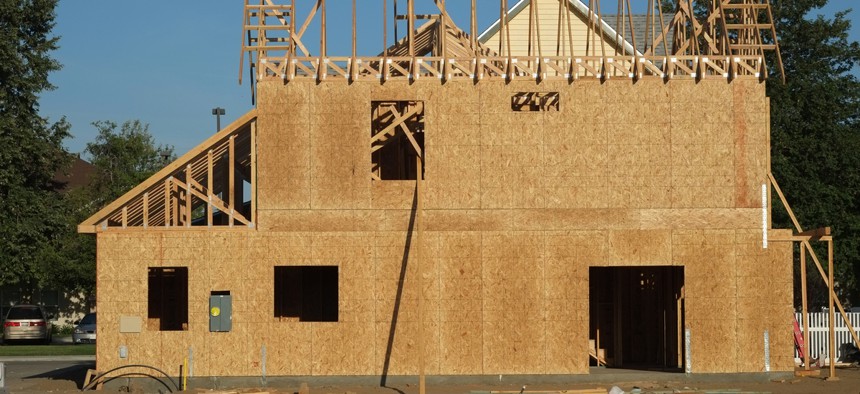California Housing Development Proposal Shelved in Legislature

A new building in California. Richard Thornton/Shutterstock

Connecting state and local government leaders
STATE AND LOCAL ROUNDUP | Illinois governor vows changes at the state child welfare agency … Santa Monica, California, bans micro housing units … Connecticut moves to establish offshore wind turbines.
A major proposal that would have required California cities to allow apartment buildings near transit stations and multi-family units in other neighborhoods was halted by legislators on Thursday. Senate Bill 50 had grabbed a lot of attention in a state with a pronounced affordable housing problem, with proponents saying it would help force denser development in communities and, therefore, drive down housing costs. But some local politicians objected to the legislation, saying it would change the character of neighborhoods currently zoned for single-family houses and wouldn’t necessarily prompt the construction of housing units affordable to low-income families. The Los Angeles City Council voted unanimously in April to oppose the proposal. State Sen. Anthony Portantino, a Democrat from La Canada Flintridge, announced that the bill was dead for this legislative session at the beginning of the Senate Appropriations Committee hearing on Thursday. The lawmaker told the Los Angeles Times that he didn’t like the idea of overriding local authority. While he was able to push off consideration of the bill himself, without a vote, it can come up again next year. A spokesman for Sen. Scott Weiner, the San Francisco lawmaker who sponsored the measure, said he is “very disappointed” and would look for a way to move forward. Gov. Gavin Newsom also expressed disappointment. “California must address the housing supply shortage head on, and we need to be able to use every tool in the toolkit to address this systemic crisis,” Newsom said in a statement. [Los Angeles Times; Curbed Los Angeles]
TINY APARTMENTS | The Santa Monica, California, city council voted to extend a ban on dwellings smaller than 375 square feet, with an exception for affordable housing projects. Council members said that they fear an overabundance of studio apartments meant for single-room occupancy (SRO), leaving less space for units designed for families. “In this day and age, there is a role for SRO units, and we simply have this [debate about] what role they have to play. I’m not sure we’re at all clear on that,” said Mayor Gleam Davis. But Commissioner Leslie Lambert disagreed. “I see no legitimate basis whatsoever for banning SROs ... Individuals and couples without children can’t afford this city, and SROs meet that need,” she said. Boston recently allowed developers to start building micro-units less than 450 square feet, but even this effort to make housing more affordable led to extremely expensive, luxury micro-units costing almost $500,000. [Santa Monica Daily Press; Curbed LA]
CHILD WELFARE | A new audit report has found systemic problems with the Illinois child welfare agency, specifically criticizing the division that provides services to children who are remaining with their families. Illinois’ new governor, J.B. Pritzker, had commissioned the report about the state Department of Children and Family Services. “This agency and the children under its care were neglected for years,” he said after it was released. “That changes right now. There is nothing more important to me as governor than protecting our state’s most vulnerable people, especially our children.” The Chicago Tribune also reported that Pritzker, a billionaire, paid for a $50,000 search for a new head of the agency during his transition. In March, his administration ended up tapping Marc Smith, who is awaiting state Senate confirmation. [Chicago Tribune]
LONG LINES | Texas lawmakers are moving on legislation aimed at reducing the long wait times to get a driver’s license. The state House passed legislation that would move jurisdiction over centers to get a license to a different agency, as well as make licenses good for eight years instead of six. [Dallas Morning News]
WIND ENERGY | A bill that would allow Connecticut to establish offshore wind turbines passed the state House of Representatives and now awaits debate in the Senate. Under the new measure, the state could solicit 2,000 megawatts of electricity, or 30% of Connecticut’s entire energy load, from wind farms off the coast. The bill’s passage follows the recent announcement by Democratic Gov. Ned Lamont about a $93 million public-private investment to upgrade the infrastructure of one of the state’s piers to accommodate wind turbines. Rep. John Piscopo, a Republican, had concerns about the size of the wind turbines. “The footprint to produce that kind of energy is huge. They’re going to dwarf any skyscraper you can think of,” he said. Piscopo was one of only ten Republicans to vote against the bill, meaning it passed with an overwhelming bipartisan majority, something that makes Katie Dykes, the commissioner of the Department of Energy and Environmental Protection (DEEP), hopeful about prospects for this industry. “This legislation sends an unmistakable signal that Connecticut is poised for historic investment in offshore wind. I applaud the legislature’s support for this bill, and here at DEEP we are looking forward to implementing this policy once it secures final passage.” [Connecticut Mirror; Hartford Courant]
Laura Maggi is the Managing Editor of Route Fifty. Emma Coleman is the Assistant Editor of Route Fifty.

NEXT STORY: Mayors Score Win in Lawsuit Over Troubled Retirement Plan Endorsement Deal




